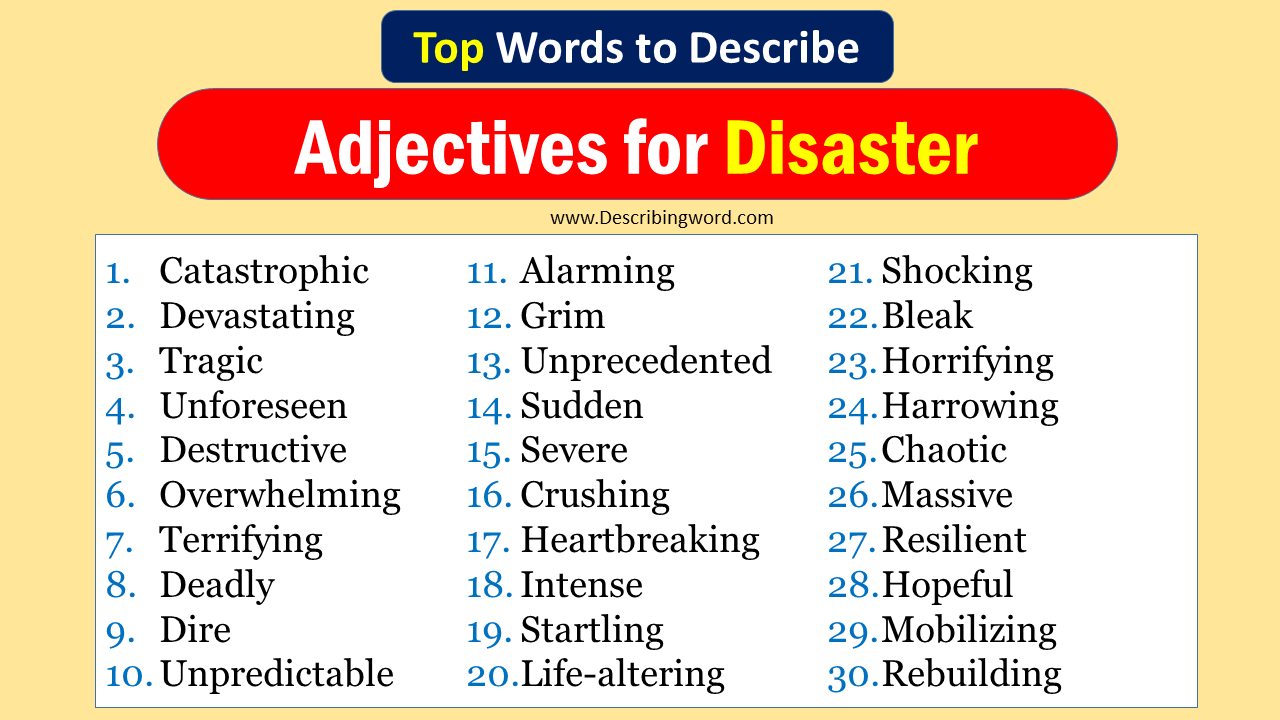Disasters can evoke a whirlwind of emotions. The adjectives we use to describe them can capture both their severity and the resilience they can foster in people and communities.
Words to Describe Disaster
Here are the most common words to describe Disaster:
- Catastrophic
- Devastating
- Tragic
- Unforeseen
- Destructive
- Overwhelming
- Terrifying
- Deadly
- Dire
- Unpredictable
- Alarming
- Grim
- Unprecedented
- Sudden
- Severe
- Crushing
- Heartbreaking
- Intense
- Startling
- Life-altering
- Shocking
- Bleak
- Horrifying
- Harrowing
- Chaotic
- Massive
- Resilient
- Hopeful
- Mobilizing
- Rebuilding
Positive Words to Describe Disaster
- Resilient
- Hopeful
- Mobilizing
- Unifying
- Awakening
- Revealing
- Instructive
- Bonding
- Transformative
- Galvanizing
Negative Words to Describe Disaster
- Catastrophic
- Devastating
- Tragic
- Destructive
- Terrifying
- Deadly
- Dire
- Overwhelming
- Grim
- Harrowing
Adjectives for Disaster
1. Catastrophic
Meaning: Involving great damage or suffering.
Example: The catastrophic disaster left thousands homeless.
2. Devastating
Meaning: Causing severe destruction.
Example: The devastating disaster affected entire communities.
3. Sudden
Meaning: Happening quickly and unexpectedly.
Example: The sudden disaster caught everyone unprepared.
4. Tragic
Meaning: Extremely sad and distressing.
Example: The tragic disaster claimed many lives.
5. Natural
Meaning: Caused by natural forces.
Example: Natural disasters include earthquakes and hurricanes.
6. Unprecedented
Meaning: Never before experienced.
Example: The unprecedented disaster overwhelmed local resources.
7. Widespread
Meaning: Affecting a large area.
Example: The widespread disaster impacted multiple countries.
8. Unavoidable
Meaning: Impossible to prevent.
Example: Despite preparation, the unavoidable disaster struck.
9. Man-made
Meaning: Resulting from human actions.
Example: Man-made disasters like oil spills can be devastating.
10. Severe
Meaning: Very serious in nature.
Example: The severe disaster caused massive destruction.
11. Life-threatening
Meaning: Endangering lives.
Example: The life-threatening disaster forced evacuations.
12. Unexpected
Meaning: Not foreseen or anticipated.
Example: The unexpected disaster took everyone by surprise.
13. Ruinous
Meaning: Causing extensive damage or loss.
Example: The ruinous disaster left the town in ruins.
14. Unfortunate
Meaning: Marked by bad luck.
Example: The unfortunate disaster struck during the night.
15. Chaotic
Meaning: Extremely disorganized and turbulent.
Example: The chaotic disaster led to widespread confusion.
16. Overwhelming
Meaning: Too powerful to manage.
Example: The overwhelming disaster exceeded emergency response capabilities.
17. Global
Meaning: Affecting multiple countries.
Example: Global disasters require international cooperation.
18. Shocking
Meaning: Extremely surprising and disturbing.
Example: The shocking disaster stunned the entire nation.
19. Sudden
Meaning: Happening abruptly and without warning.
Example: The sudden disaster left no time to prepare.
20. Heartbreaking
Meaning: Causing great sorrow or pain.
Example: The heartbreaking disaster left families grieving.

Other Words to Describe Disaster
Words to Describe Natural Disaster
- Geological
- Meteorological
- Climatic
- Uncontrollable
- Mother-nature-driven
- Elemental
- Environmental
- Inevitable
- Seasonal
- Tectonic
Words to Describe the Titanic Disaster
- Icy
- Maritime
- Fateful
- Doomed
- Infamous
- Unsinkable
- Historic
- Atlantic
- Maiden-voyage
- Shipwrecked
Words to Describe Tsunami Disaster
- Oceanic
- Seismic
- Tidal
- Swelling
- Inundating
- Coastal
- Wave-driven
- Engulfing
- Surge
- Aftershock-triggered
Funny Words to Describe Disaster
- Blunderful
- Oops-tastic
- Fiasco-fueled
- Calamity-comedy
- Mishap-mania
- Flub-fest
- Catastro-funny
- Disaster-rama
- Goof-gone-bad
- Cataclysmic-clowning
How to Describe Disaster in Writing?
When penning down a disaster, it’s crucial to capture the raw emotions and stark realities. Begin by setting the scene, emphasizing the suddenness and unexpected nature of the event. Describe the environment – the smells, sounds, and visuals that accentuate the intensity of the situation.
Transitioning into the heart of the disaster, highlight the immediate reactions of the people affected. This might include panic, shock, or a fight for survival. The bleakness, the loss, and the chaos should be palpable.
Yet, amidst the darkest tales, stories of resilience, hope, and unity often emerge. In the aftermath, communities come together, bonds strengthen, and recovery begins. Highlighting this juxtaposition can provide a more holistic picture of the disaster, capturing both its devastation and the indomitable human spirit.
Explore Related Words:

